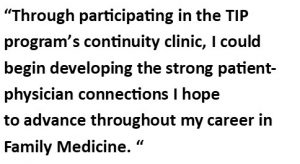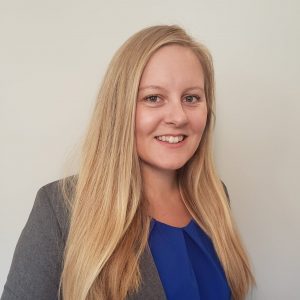Cassandra LaMarche, MS4, is a current TIP student at the Ascension Providence Family Medicine Residency.
by Cassandra LaMarche, MS4
I knocked on the tattered blue door of a small home with chipping paint and a broken step. In my hands, I carried a large box full of canned foods, Christmas gifts, bottled water, and water filters. “Can I help you?” said a voice full of suspicion emanating from inside. Soon after mentioning I was a volunteer with Crossing Waters, reservation turned into an invitation to enter. The overwhelming smell of cigarette smoke hit my lungs while I gazed around the small home and scribbled mental notes: No fire alarms, a large crack in the ceiling, and an oven door open for heat. My eyes darted to a red light over the kitchen faucet blinking back at me, indicating a broken water filter, perhaps a real life metaphor for the intersection of the compounding health disparities experienced by the people of Flint.
My public health training instilled in me a passion for using education to combat interweaving health disparities. Through Crossing Waters, I taught community members within their homes about the importance of water filters, one of the only remaining preventative barriers that could keep them from drinking lead-tainted water. During the pandemic, I also developed and implemented COVID-19 safety protocols and education for volunteers on these procedures so we could continue to provide essential services. Furthermore, I collaborated with the health department and physicians to develop a volunteer program to have medical students call patients to educate them about COVID-19 and to assess their needs. These experiences furthered my appreciation for public health education as a successful way to improve the health of individuals who may not otherwise have access to healthcare. I am interested in continuing to develop my relationship with local health departments to promote health on a population level. Through the development of my own public health project as part of the TIP program, I would be able to further strengthen my public health knowledge in a real-world setting.
 During my first two years of medical school in Grand Rapids, I was exposed to an existing TIP project through my role as the President of the American Medical Women’s Association. In this role, I partnered with Catherine’s Health Center to expand on an existing TIP project that worked to educate patients on a variety of health topics and taught patients how to cook low cost healthy meals. This experience improved my ability to discuss challenging health topics in an easy to understand manner and furthered my appreciation of the many barriers to health that extend beyond the individual.
During my first two years of medical school in Grand Rapids, I was exposed to an existing TIP project through my role as the President of the American Medical Women’s Association. In this role, I partnered with Catherine’s Health Center to expand on an existing TIP project that worked to educate patients on a variety of health topics and taught patients how to cook low cost healthy meals. This experience improved my ability to discuss challenging health topics in an easy to understand manner and furthered my appreciation of the many barriers to health that extend beyond the individual.
Reflecting on my many clinical and volunteer experiences throughout medical school, continuity of care was often lacking. Short rotations through the hospital rarely allowed for repeat exposure to the same patient, and it left me constantly hoping for more. I wondered, for example, if my long conversation about how to quit smoking would stay with my patient or if I was missing something a patient failed to tell me because they did not trust me yet. I want to build the kind of trusting relationships I witnessed develop from the long standing partnership between Crossing Waters and the Flint community. Through participating in the TIP program’s continuity clinic, I could begin developing the strong patient-physician connections I hope to advance throughout my career in Family Medicine.
My strong interests in public health, preventative medicine, and patient education lend themselves well to a career in this diverse field and make me confident that Family Medicine is the ideal specialty for me, where prevention and education go hand-in-hand. I believe the TIP program can help me succeed as a Family Physician by providing opportunities to engage with the local health department and the community, develop my relationships with colleagues and mentors within the program, and begin forming important patient connections. Through the TIP program, I know I will experience many moments that highlight the multiple layers of patient need and barriers to patient health that I will be able to use throughout my career to help my patients.



